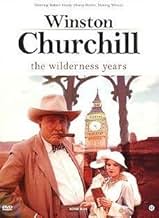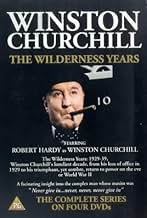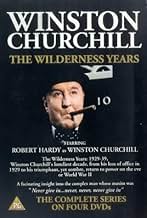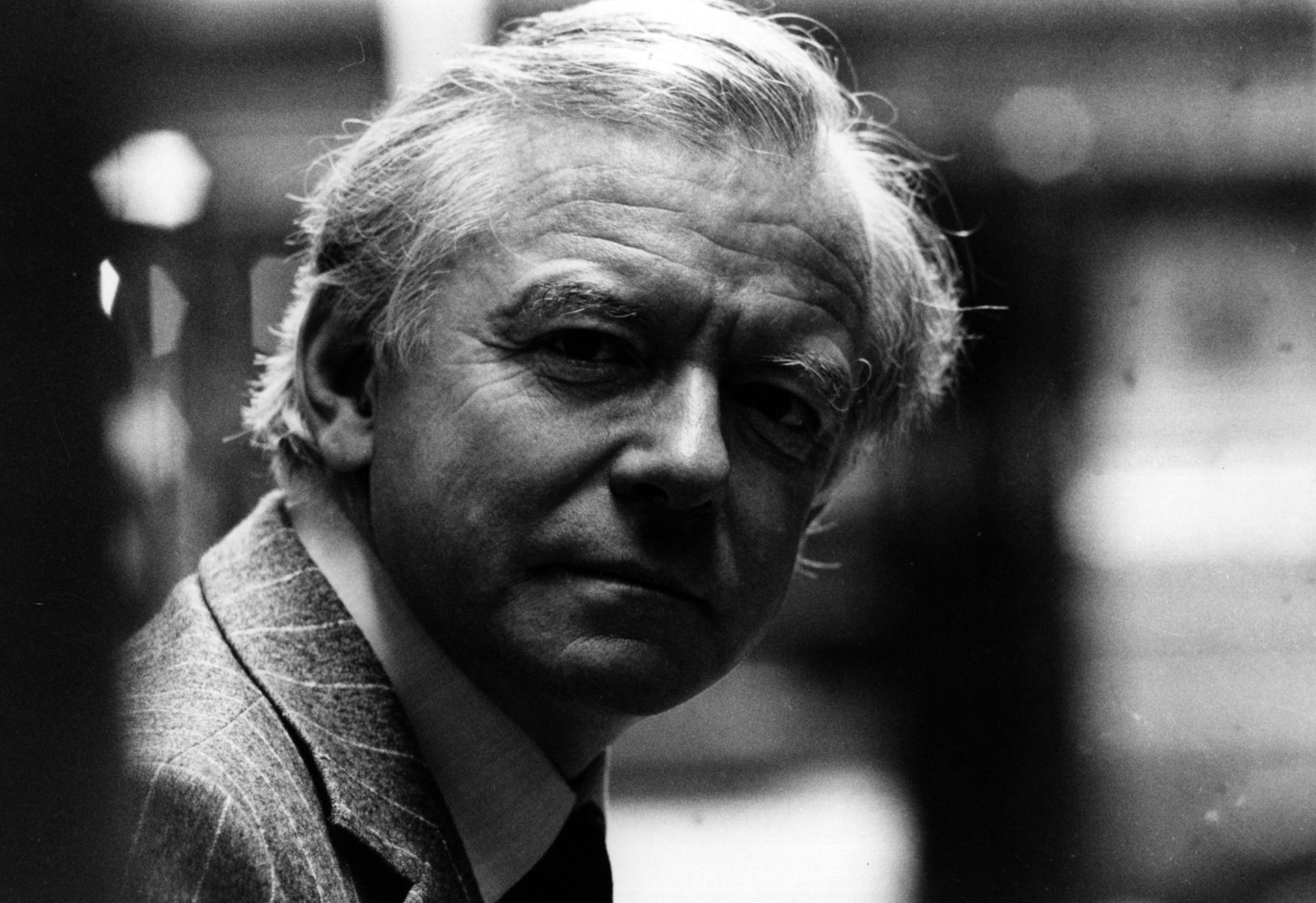Le sconfitte di un vincitore: Winston Churchill 1928-1939
Titolo originale: Winston Churchill: The Wilderness Years
- Mini serie TV
- 1981
- 1h
VALUTAZIONE IMDb
8,4/10
356
LA TUA VALUTAZIONE
Aggiungi una trama nella tua linguaThe story of Winston Churchill's life between 1929, when he lost his cabinet position, and 1939, when he joined Great Britain's War Cabinet - a period he described as the most difficult in h... Leggi tuttoThe story of Winston Churchill's life between 1929, when he lost his cabinet position, and 1939, when he joined Great Britain's War Cabinet - a period he described as the most difficult in his life.The story of Winston Churchill's life between 1929, when he lost his cabinet position, and 1939, when he joined Great Britain's War Cabinet - a period he described as the most difficult in his life.
- Nominato ai 8 BAFTA Award
- 1 vittoria e 8 candidature totali
Sfoglia gli episodi
Recensioni in evidenza
Have to agree with everything that the others have said before me. This is a superb, outstanding drama and the kind of thing that good modern history lessons should be built around in school. One or two others have described it as flawless - I agree: and some of the dramatic touches added by the lighting are almost genius. One thing that some people may not know is that some of it - particularly some of the outdoor scenes but also I suspect, some appropriate indoor scenes - were shot at Chartwell, Churchill's country house which is preserved for the public and has a warm and friendly, home "family" atmosphere. And yes, Churchill did indeed get a kick out of building a wall or two there, as well as painting some interesting pictures - his art is much more highly regarded by the critics than Hitler's!!
Robert Hardy is the most convincing imitator of Churchill I've seen. He is wisely depicted here with his foibles - his rashness and ineptitude in areas beyond his ken, such as the stock market and raising offspring - as well as strengths. And it's a treat to see Siân Phillips and Tim Pigott-Smith supporting.
Here's a story well-told, with interesting locations, too, from Churchill's home at Chartwell, in UK, to the Arizona desert. For anyone with an appreciation of the titanic events that shaped World War II, "The Wilderness Years" provides invaluable background, not only for Churchill as a major player, but for the others - Baldwin, Beaverbrook, Chamberlain, as well as movers and shakers with unfamiliar names, like the oily Sir Samuel Hoare, who manipulated and connived on behalf of appeasement.
Despite the mediocre print I highly recommend "The Wilderness Years" as an enriching docudrama that deserves repeated viewing. My only regret is, that Robert Hardy did not continue the Churchill saga through the war years. What a smashing tale that would have been!
Here's a story well-told, with interesting locations, too, from Churchill's home at Chartwell, in UK, to the Arizona desert. For anyone with an appreciation of the titanic events that shaped World War II, "The Wilderness Years" provides invaluable background, not only for Churchill as a major player, but for the others - Baldwin, Beaverbrook, Chamberlain, as well as movers and shakers with unfamiliar names, like the oily Sir Samuel Hoare, who manipulated and connived on behalf of appeasement.
Despite the mediocre print I highly recommend "The Wilderness Years" as an enriching docudrama that deserves repeated viewing. My only regret is, that Robert Hardy did not continue the Churchill saga through the war years. What a smashing tale that would have been!
10sissoed
I was very impressed by this film when it was broadcast in the 1980s, and have watched it many times since buying it on DVD. Robert Hardy's portrayal of Churchill is masterful, passionate, convincing, and authentic.
But what especially makes this one of the best-ever historical dramatizations are the performances of the other key actors: the men who portray Churchill's political colleagues and competitors. Edward Woodward, portraying Samuel Hoare, presents such a mixture of personal ambition, policy idealism, and jealousy that you feel you are experiencing a real human being, not a caricature that is simply performing a role to make a dramatic conflict with the main character.
The same is true of the other key roles. Peter Barkworth as Prime Minister Stanley Baldwin presents a calculating but tactful politician. Eric Porter as Neville Chamberlain is a compelling performance of a man so focused on the pursuit of peace and economic well- being at home that he deceives himself as to Hitler and the Nazis' true character.
Without exception, there are no stereotypes, no simplistic characters, presented here. All of Churchill's opponents are good men, dedicated to the peace and prosperity of the British people, whose flaw is that they are so dedicated to that cause that they deceive themselves regarding the character of Hitler.
Indeed, in many ways, after researching the history of the subjects covered, I grew to like Churchill's opponents almost as much as I like Churchill. A major sequence in this film focuses on India where the supposed "villain," Samuel Hoare, is working overtime to achieve a reform bill for India that gives greater freedom and self-government to the Indian people, in part by removing a restrictive trade law that gave Manchester cotton-men a guaranteed market in India. The testimony Hoare suppressed and that Churchill is so keen to expose was in favor of perpetuating protectionism that raised the prices paid by poor Indians. This film ignores this, because it reveals Churchill to be a reactionary anti-free- trade protectionist on this issue. The India bill that Churchill opposed, and that Hoare, Baldwin, and Ramsey Macdonald (also one of the Prime Ministers portrayed) supported was a visionary bill that did honor to the British people, and it has been forgotten only because World War II, and the subsequent Indian independence movement, have buried it under the weight of more significant history. Then later, Hoare becomes one of those who realizes the true character of Hitler, and it is he, not Churchill, who forces Chamberlain to act after the Nazi invasion of Poland. If I were the ghost of Sir Samuel Hoare, I would find this film to be a great vindication.
Churchill as presented here and, I think, in real life was a feeling, but not a calculating, man. Again and again in this film, Churchill due to his good nature is tricked by the deceits of his opponents, to the point that he comes across almost as unintelligent. As Stanley Baldwin puts it at a key point in this film, if Britain went to war, Churchill would be the best choice for Wartime Prime Minister, but in peace, never. There is a fair amount of Churchill idolatry on the conservative side of the American political spectrum, which ought to be tempered with the recognition that a rational and calculating mind is usually what is needed to run a government.
In 1940, after the disaster at Dunkirk, a trio of journalists writing under the pen-name Cato produced a short book, "Guilty Men," that blamed Chamberlain, Baldwin, Hoare, and others for misjudgments and self-interest that led to the "appeasement" policy. The book was hugely popular and has colored the public and academic-historical understanding of the "Wilderness Years" ever since. This film follows the same line, as does the 2007 book "Troublesome Young Men" by Lynne Olson. But as reviewer Andrew Stuttaford wrote in the New York Sun, this view "spared the rest of the British people the embarrassment of asking themselves what exactly they had been doing while the threat from the Third Reich grew. It was, after all, a period in which Britons in their millions had not only participated in 1935's unofficial 'Peace Ballot' (collective security, 'effective' sanctions, you know how it goes), but had also, after three more years of Hitler, taken to the streets to celebrate the deal Chamberlain cut at Munich." And as Evan Thomas wrote in Newsweek (23 June 2008), Franklin Roosevelt's response to Chamberlain's Munich deal was a telegram to Chamberlain saying "good man," and FDR wrote the US ambassador to Italy "I am not a bit upset over the final result."
The lesson of this film is that many of us, when we set out on a career and identify goals that we want to achieve to make great reputations for ourselves, have a tendency to see the other people we encounter in life as having personalities and motivations that will facilitate our getting what we want. As presented here, Baldwin wanted peace and prosperity for Britain, and so he seized on the idea that while Hitler was warlike, Hitler wanted war only with the Soviets, not with the West, so Britain need not fear. His successor, Chamberlain, also wanted peace and prosperity, and knew that he would be thwarted if Hitler really was all-out for war; so he saw Hitler as also being a man who wanted peace and prosperity. Both men gambled on Hitler, and Germany, being a leader and nation that would, due to their own interests and preferences, act in ways that would make it possible for Baldwin and Chamberlain to achieve their own ends. The lesson here for us today is to separate-out from our assessments of foreign leaders the way we hope those leaders are if we are to achieve our own goals.
But what especially makes this one of the best-ever historical dramatizations are the performances of the other key actors: the men who portray Churchill's political colleagues and competitors. Edward Woodward, portraying Samuel Hoare, presents such a mixture of personal ambition, policy idealism, and jealousy that you feel you are experiencing a real human being, not a caricature that is simply performing a role to make a dramatic conflict with the main character.
The same is true of the other key roles. Peter Barkworth as Prime Minister Stanley Baldwin presents a calculating but tactful politician. Eric Porter as Neville Chamberlain is a compelling performance of a man so focused on the pursuit of peace and economic well- being at home that he deceives himself as to Hitler and the Nazis' true character.
Without exception, there are no stereotypes, no simplistic characters, presented here. All of Churchill's opponents are good men, dedicated to the peace and prosperity of the British people, whose flaw is that they are so dedicated to that cause that they deceive themselves regarding the character of Hitler.
Indeed, in many ways, after researching the history of the subjects covered, I grew to like Churchill's opponents almost as much as I like Churchill. A major sequence in this film focuses on India where the supposed "villain," Samuel Hoare, is working overtime to achieve a reform bill for India that gives greater freedom and self-government to the Indian people, in part by removing a restrictive trade law that gave Manchester cotton-men a guaranteed market in India. The testimony Hoare suppressed and that Churchill is so keen to expose was in favor of perpetuating protectionism that raised the prices paid by poor Indians. This film ignores this, because it reveals Churchill to be a reactionary anti-free- trade protectionist on this issue. The India bill that Churchill opposed, and that Hoare, Baldwin, and Ramsey Macdonald (also one of the Prime Ministers portrayed) supported was a visionary bill that did honor to the British people, and it has been forgotten only because World War II, and the subsequent Indian independence movement, have buried it under the weight of more significant history. Then later, Hoare becomes one of those who realizes the true character of Hitler, and it is he, not Churchill, who forces Chamberlain to act after the Nazi invasion of Poland. If I were the ghost of Sir Samuel Hoare, I would find this film to be a great vindication.
Churchill as presented here and, I think, in real life was a feeling, but not a calculating, man. Again and again in this film, Churchill due to his good nature is tricked by the deceits of his opponents, to the point that he comes across almost as unintelligent. As Stanley Baldwin puts it at a key point in this film, if Britain went to war, Churchill would be the best choice for Wartime Prime Minister, but in peace, never. There is a fair amount of Churchill idolatry on the conservative side of the American political spectrum, which ought to be tempered with the recognition that a rational and calculating mind is usually what is needed to run a government.
In 1940, after the disaster at Dunkirk, a trio of journalists writing under the pen-name Cato produced a short book, "Guilty Men," that blamed Chamberlain, Baldwin, Hoare, and others for misjudgments and self-interest that led to the "appeasement" policy. The book was hugely popular and has colored the public and academic-historical understanding of the "Wilderness Years" ever since. This film follows the same line, as does the 2007 book "Troublesome Young Men" by Lynne Olson. But as reviewer Andrew Stuttaford wrote in the New York Sun, this view "spared the rest of the British people the embarrassment of asking themselves what exactly they had been doing while the threat from the Third Reich grew. It was, after all, a period in which Britons in their millions had not only participated in 1935's unofficial 'Peace Ballot' (collective security, 'effective' sanctions, you know how it goes), but had also, after three more years of Hitler, taken to the streets to celebrate the deal Chamberlain cut at Munich." And as Evan Thomas wrote in Newsweek (23 June 2008), Franklin Roosevelt's response to Chamberlain's Munich deal was a telegram to Chamberlain saying "good man," and FDR wrote the US ambassador to Italy "I am not a bit upset over the final result."
The lesson of this film is that many of us, when we set out on a career and identify goals that we want to achieve to make great reputations for ourselves, have a tendency to see the other people we encounter in life as having personalities and motivations that will facilitate our getting what we want. As presented here, Baldwin wanted peace and prosperity for Britain, and so he seized on the idea that while Hitler was warlike, Hitler wanted war only with the Soviets, not with the West, so Britain need not fear. His successor, Chamberlain, also wanted peace and prosperity, and knew that he would be thwarted if Hitler really was all-out for war; so he saw Hitler as also being a man who wanted peace and prosperity. Both men gambled on Hitler, and Germany, being a leader and nation that would, due to their own interests and preferences, act in ways that would make it possible for Baldwin and Chamberlain to achieve their own ends. The lesson here for us today is to separate-out from our assessments of foreign leaders the way we hope those leaders are if we are to achieve our own goals.
Very accurate telling of Churchill's life while out of office and his struggle to warn the UK of the Nazi peril. Hardy puts his soul into it, though he comes off as whiny or pouting at times rather than as the British bulldog Churchill was. Fascinating stuff!
10mc3852
This mini-series is truly a classic, the best historical drama that I have ever seen. There are slow spots whenever the action moves away from Churchill, or else the mini-series travels over-familiar territory like German preparations for World War II, but these points are simply quibbles. You literally hear the clash of arms, the ring of combat and the roars of the crowd as Churchill battles one foe after another, often defeated but never giving up. I swear, this movie will give you chills with the sense of history being made.
PBS broadcast the mini-series in 1986. Drew Middleton, a WWII correspondent, said that it had the force of Greek tragedy, Churchill the antagonist while everyone--friends, family, political opponents--became part of the chorus. Robert Hardy performs that role magnificently. He has done good work in "Middlemarch", "Elizabeth R" and "All Creatures Great and Small", but those roles are simply dwarfed by his Churchill. Alternately raging, noble, petty-minded, sulking, humorous, sly and generous, Hardy's Churchill is a character of Shakespearean proportions. Rarely does an actor match the emotional force of an historical giant, but Hardy succeeds. Over eight hours, Hardy is never dull.
Still, a great hero is nothing without opposition. When Hardy did a one-man show of Churchill, I was terribly disappointed. Hardy was still doing what he did before but, without context and response, his performance seemed little more than a recital of greatest hits. It is really the entire cast, uniformly excellent, that lifts this mini-series above the usual attempt at history. Nigel Havers does an entertaining and ultimately tragic performance as Randolph, Churchill's beloved son, who is already being ruined by his father's indulgence and overblown expectations. Peter Barkworth as Samuel Baldwin is the ultimate politician, ever so slyly maneuvering with one honest insincerity after another so that, through a bewildering series of missteps that no one but he can understand, he gets exactly what he wants. But Churchill's greatest opponent is Neville Chamberlain. Eric Porter plays him full of arrogance and incomprehension, already marked by the flaws which Hitler will brilliantly exploit. Yet the gradual breakdown, his ultimate realization that his best efforts have led to nothing but ruin, gives Chamberlain a measure of tragic dignity that makes him sympathetic despite the historical record. Churchill is a triumphant Henry V, but Porter plays the blinded hero of his own Greek tragedy to perfection.
An aside. The opening and closing music of this mini-series matches with the greatest music ever made for the movies. Starting mysteriously dim and obscure, it swells into a mighty torrent of sound and victory, at once enthralling to the ear and a perfect encapsulation of the mini-series. If Churchill had had a taste for such music, he would have loved it. Comparable to Strauss' "Thus Spake Zarathustra" but infinitely better, the theme music really conveys the character of Churchill and of the times.
PBS broadcast the mini-series in 1986. Drew Middleton, a WWII correspondent, said that it had the force of Greek tragedy, Churchill the antagonist while everyone--friends, family, political opponents--became part of the chorus. Robert Hardy performs that role magnificently. He has done good work in "Middlemarch", "Elizabeth R" and "All Creatures Great and Small", but those roles are simply dwarfed by his Churchill. Alternately raging, noble, petty-minded, sulking, humorous, sly and generous, Hardy's Churchill is a character of Shakespearean proportions. Rarely does an actor match the emotional force of an historical giant, but Hardy succeeds. Over eight hours, Hardy is never dull.
Still, a great hero is nothing without opposition. When Hardy did a one-man show of Churchill, I was terribly disappointed. Hardy was still doing what he did before but, without context and response, his performance seemed little more than a recital of greatest hits. It is really the entire cast, uniformly excellent, that lifts this mini-series above the usual attempt at history. Nigel Havers does an entertaining and ultimately tragic performance as Randolph, Churchill's beloved son, who is already being ruined by his father's indulgence and overblown expectations. Peter Barkworth as Samuel Baldwin is the ultimate politician, ever so slyly maneuvering with one honest insincerity after another so that, through a bewildering series of missteps that no one but he can understand, he gets exactly what he wants. But Churchill's greatest opponent is Neville Chamberlain. Eric Porter plays him full of arrogance and incomprehension, already marked by the flaws which Hitler will brilliantly exploit. Yet the gradual breakdown, his ultimate realization that his best efforts have led to nothing but ruin, gives Chamberlain a measure of tragic dignity that makes him sympathetic despite the historical record. Churchill is a triumphant Henry V, but Porter plays the blinded hero of his own Greek tragedy to perfection.
An aside. The opening and closing music of this mini-series matches with the greatest music ever made for the movies. Starting mysteriously dim and obscure, it swells into a mighty torrent of sound and victory, at once enthralling to the ear and a perfect encapsulation of the mini-series. If Churchill had had a taste for such music, he would have loved it. Comparable to Strauss' "Thus Spake Zarathustra" but infinitely better, the theme music really conveys the character of Churchill and of the times.
Lo sapevi?
- QuizA year before he died, Robert Hardy was interviewed by actor James Murray about this series for "Robert Hardy Remembers Churchill's Wilderness Years" at the Theatre Royal, Winchester, as part of The Winchester Festival 2016, with all proceeds going to The Murray Parish Trust in raising money for a new children's Emergency Department at Southampton University Hospital.
- BlooperIn the first episode, "Down and Out," Churchill is seen giving a speech in the USA in 1929. A US flag is visible to his right, and the field (with the stars) is visible. The stars are in staggered rows, meaning it is a 50 star US flag. A 48-star flag, as in use in 1929, would have even rows of stars (six rows of eight).
- ConnessioniReferenced in 28 Up (1984)
I più visti
Accedi per valutare e creare un elenco di titoli salvati per ottenere consigli personalizzati
- How many seasons does Winston Churchill: The Wilderness Years have?Powered by Alexa
Dettagli
- Data di uscita
- Paese di origine
- Lingua
- Celebre anche come
- Winston Churchill: Os Anos Agitados
- Luoghi delle riprese
- Azienda produttrice
- Vedi altri crediti dell’azienda su IMDbPro
Contribuisci a questa pagina
Suggerisci una modifica o aggiungi i contenuti mancanti

Divario superiore
By what name was Le sconfitte di un vincitore: Winston Churchill 1928-1939 (1981) officially released in India in English?
Rispondi

































